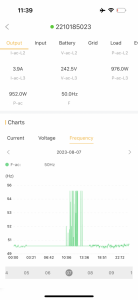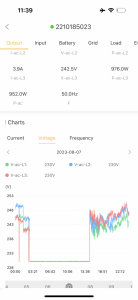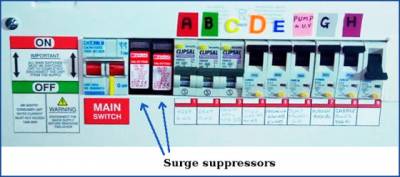Power cut, now 2x fan motors and PCB bust
We had a Powercut a few weeks ago and although we were out I could see the power went on/off a few times
Now the ASHP isn’t working. Both fan motors and the PCB need replacing, over £1000
it seems Mitsubishi won’t cover under warranty (work in progress…) as they are blaming the electricity supply
Anyone had any experience with this? Should it be covered?
My solar inverter logs voltage and it seemed steady around that time (but it’s always on the high end… 250v) so they have fitted a voltage recorder but no update from them yet.
250sqm house. 30kWh Sunsynk/Pylontech battery system. 14kWp solar. Ecodan 14kW. BMW iX.
Posted by: @bensebWe had a Powercut a few weeks ago and although we were out I could see the power went on/off a few times
Now the ASHP isn’t working. Both fan motors and the PCB need replacing, over £1000
it seems Mitsubishi won’t cover under warranty (work in progress…) as they are blaming the electricity supply
Anyone had any experience with this? Should it be covered?
My solar inverter logs voltage and it seemed steady around that time (but it’s always on the high end… 250v) so they have fitted a voltage recorder but no update from them yet.
This is quite interesting in that several points of contention raise their ugly heads.
It is quite possible that during the power cut and subsequent restoration, the supplied voltage may have exceeded the maximum tolerance, and could possibly have caused damage within the heat pump.
Conversely, one would hope that a heat pump would be designed to withstand power surges, and remain functional without damage.
So who should be held accountable for the subsequent damage?
If the DNO's system and equipment allowed the voltage to exceed permitted limits, then surely they will hold up their hands and say 'sorry, our fault, please send us the bill'. Joking apart, I suspect that even if the voltage exceeded permitted limits, they would be unlikely to admit that was the case and accept responsibility.
The DNO are more likely to claim that Mitsubishi should have designed their equipment to withstand such a voltage surge, so obviously the failure was caused by Mitsubishi.
Mitsubishi on the other hand, rather than admit that there may be some weakness in their equipment, and offer to replace the parts free of charge so that they can take the damage parts for examination, will no doubt try to blame the DNO, or even the customer for leaving the equipment switched on whilst unattended. 🙄
This unfortunately is the World in which we now live, where so called reputable companies will bend over backwards to try to avoid admitting any form of accountability. Long gone are the days when the 'customer was always right'.
I suppose you could try claiming on your home insurance, but I suspect that they will state that they are quite happy to continue accepting the ever increasing renewal fee, provided that you don't try to make any form of claim.
I would hope that your DNO should have records of what happened during the power cut detailing voltage and current surges within your area, you may be able to request a copy of such information.
@derek-m yes you’re quite right. Everyone pointing fingers at each other
What I do have in my favour is the recording from the solar inverter. Interestingly it doesn’t show much on the voltage side (I believe it flatlines at 230v as it’s 3 phase and one phase was still on)
however the frequency graph shows something very different. With it spiking to 55Hz repeatedly. Which is way way way outside of the intended rnage
so I may go to the DNO armed with this. Mitsubishi shouldn’t have to deal with 55Hz as it’s outside of the UK power networks spec (+/-1%) so maybe they will look into it.
250sqm house. 30kWh Sunsynk/Pylontech battery system. 14kWp solar. Ecodan 14kW. BMW iX.
Oooh...so many red flags hovering here! As an Ecodan owner on a single phase "normal" domestic supply, would/should my consumer unit have caught all this nastiness before it fried the heat pump?
@abernyte who knows. Surely the DNO should be ensuring our supply is within the legal tolerance limits?
Would local surge protection even help when it’s a frequency issue vs a voltage spike?
How far are we expected to go… !
250sqm house. 30kWh Sunsynk/Pylontech battery system. 14kWp solar. Ecodan 14kW. BMW iX.
Posted by: @benseb@abernyte who knows. Surely the DNO should be ensuring our supply is within the legal tolerance limits?
Would local surge protection even help when it’s a frequency issue vs a voltage spike?
How far are we expected to go… !
Obviously it is difficult to state with any degree of confidence what may have been the root cause of the failures, without knowing what components failed, particularly on the circuit board.
Frequency variations are not normally a cause of failure, it is more likely to be high voltage or high current.
If the heat pump is designed for 3 phase supply, then loss of one or more phases will have an effect, but I would still hope that the heat pump would have been designed to shutdown and prevent equipment damage in such a scenario.
I lost the main circuit board about 4 years ago on my ASHP. I was never sure why but it was expensive to replace.
We live in a rural area with relatively frequent micro power cuts.
After replacing the circuit board I installed a surge supressor on the main supply box. It doesn't stop power cuts but at least it irons out any spikes for the entire house.
I was surprised to learn from the electrician that these are only optional, not mandatory in the building regs. Why?
Given how many of us have sensitive electronic domestic equipment these days it seems to be something of an oversight.
Mike
Grant Aerona HPID10 10kWh ASHP
I agree with @derek-m that it's very unlikely for a frequency variation to have been the cause of the breakdown described by @benseb.
It is just as likely that what is being recorded as a series of 55Hz anomalies could be due to the circuitry responding to harmonics created within the heat pump itself.
If such a frequency variation had been genuinely occurring on the 3-phase supply from the local substation, then it's likely that it was also recorded by your regional DNO.
Who is that DNO?
What geographical region are you in?
Has the DNO got a faults website page, where they tell the public what the grid fault was?
Like @mike-patrick, I too have surge suppressors...
both on the mains incomer to the house and for the rooftop solar-panel arrays.
I have experience in this field and appreciate the different sorts of surge they are designed to quench, and how they should be fitted.
All of my surge suppression systems are manufactured by Phoenix Contact, based in Southern Germany.
They are designed to send the surge/spike to earth, and then heal very quickly in order to deal with the next spike in a series.
If you want to learn more on this topic, then now's your chance!
Save energy... recycle electrons!
- 27 Forums
- 2,523 Topics
- 58.7 K Posts
- 417 Online
- 6,802 Members
Join Us!
Worth Watching
Latest Posts
-
RE: A Single Voice for Heat Pumps, But Will It Finally Raise Industry Standards?
From what I’ve read, the Heat Pump Association UK is me...
By Jonatan , 50 minutes ago
-

Do that anyway, the main system controller that you use...
By JamesPa , 56 minutes ago
-

RE: Tell us about your Solar (PV) setup
Pylontech US5000 stores about 4.3 kWh accounting for in...
By bobflux , 1 hour ago
-
RE: Underfloor Heating Installation Issues with Heat Pump
Hi @martinhook_uk @bobflux The installer is making g...
By Maximumdo , 2 hours ago
-
RE: Octopus Cosy 12 Heat Pump Regret: Incredibly Loud, Poor Heating & Constant Hum - Help!
Hi all, Just an update on where we are with the "Consta...
By DEdwards , 2 hours ago
-
RE: How to control DHW with Honeywell EvoHome on Trianco ActiveAir 5 kW ASHP
Well I've had an interesting few days and would like to...
By giganto , 16 hours ago
-

RE: Peak Energy Products V therm 16kW unit heat pump not reaching flow temperature
Yes, here's mine. From the service manual parts numbers...
By bobflux , 20 hours ago
-

Had to learn the hard way 🤣 now I'm sharing T...
By bobflux , 20 hours ago
-

RE: Issue with a Grant Air Source Heat Pump & Tado Smart Thermostat
Im assuming from your original post that hysterisis ref...
By JamesPa , 21 hours ago
-
RE: Heat Pump vs New Gas Boiler for Inherited House - Worth the Extra Cost?
Hi @fretless6 Mike, I have experience with Taggas (Re...
By Old_Scientist , 24 hours ago
-
RE: Daikin Altherma 3 LT compressor longevity question
@bobflux With my limited HA skills I can't ad...
By Ubert767 , 1 day ago
-
RE: Testing new controls/monitoring for Midea Clone ASHP
Now seems a good time to summarise the costs and effici...
By benson , 1 day ago
-
RE: Connecting Growatt SPH5000 over wired ethernet rather than wireless
The simplest wired option is usually the Growatt Ethern...
By Jonatan , 1 day ago
-

RE: Electricity price predictions
@jamespa And it seems some of the nasty public cloud...
By Batpred , 2 days ago
-

RE: Jokes and fun posts about heat pumps and renewables
Technology is rapidly advancing. BBC News reported th...
By Transparent , 2 days ago
-

RE: Do Fridges and Freezers have COP ratings?
@editor Thank you all for your replies and submitted in...
By Toodles , 2 days ago
-

I know and yes. The secondary deltaT wont necessaril...
By JamesPa , 2 days ago
-

RE: Designing heating system with air to water heat pump in France, near Lyon
Just love the way you put it! 🤣
By Batpred , 3 days ago
-

RE: Safety update; RCBOs supplying inverters or storage batteries
Thank you for sharing. So it seems that your Schneid...
By Batpred , 3 days ago
-

RE: Forum updates, announcements & issues
@upnorthandpersonal thanks for the thoughtful, consider...
By Mars , 3 days ago
-

RE: Solar Power Output – Let’s Compare Generation Figures
@mk4 All 21 panels have their own Enphase IQ7a microinv...
By Toodles , 3 days ago
-
RE: Setback savings - fact or fiction?
Great, so you have proven that MELCloud is consistently...
By RobS , 4 days ago






